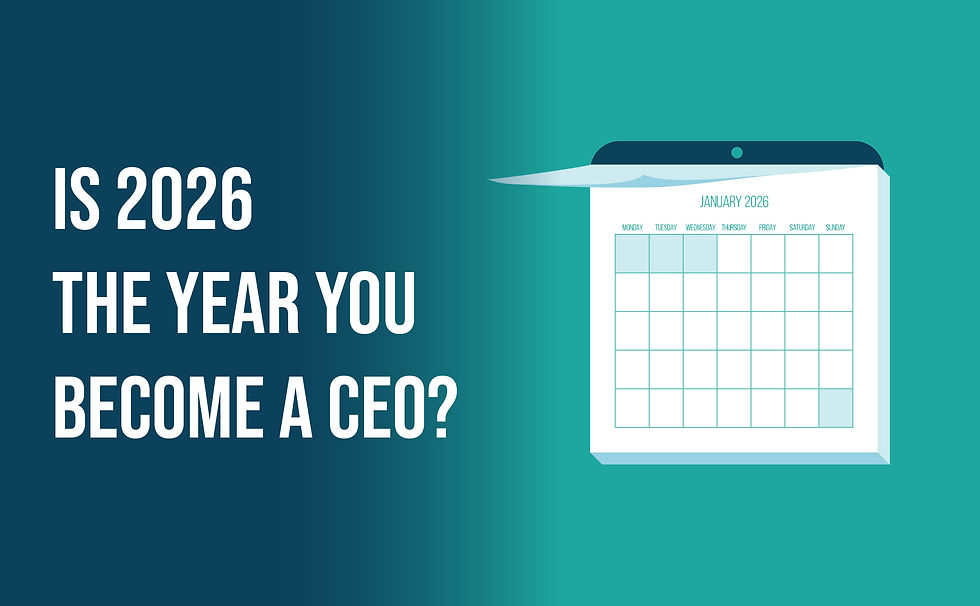What does an executive interview coach do exactly?
- May 5, 2025
- 4 min read
Updated: Jul 10, 2025

You might have heard the term ‘executive interview coach’ and wondered what exactly we do.
A coach is someone who teaches people how to improve at a sport, in a particular subject, or to enhance a skill. In our case, we teach executives how to improve their interview skills. However, there’s more to it than just learning how to nail the interview questions.
Here, Executive Interview Coaching founder Richard Elstone explains what the role of an executive interview coach is, the best time to get coaching and why it’s crucial to success.
Who we coach
Executive Interview Coaching works with executives such as Chief Financial Officers (CFOs), General Managers, Heads of Marketing or Human Resources, and Chief Executive Officers (CEOs) who are looking for their next appointment. Almost all, if not all of them, have made a difference to the organisations they’ve worked in.
“These executives may have done several interviews in their life, but they really don’t know what a good interview looks like or sounds like,” says Richard. “They have very little idea what people in executive search firms are looking for in terms of their background and their CV. Whilst they may have some idea of what some of the interview questions might be, they don’t know whether their answers are good enough to land them the position they want.”
What we do
An executive interview coach assists with so much more than just fine-tuning resumes and guiding clients as to how to answer the job description criteria. Let’s take a look.
Turning perceived negatives around
We will help foresee any objections a hiring manager may have to hiring the executive, and help our clients to turn those around.
“For example, a lot of people get nervous about confronting a question around gaps in their CV, if say, they have taken a year off,” says Richard. “The best thing to do is to have a confidential discussion with me about what led to that and then work out how to pitch it effectively.
“Someone might have a reputation internally for being laid back, or for being too nice. I help recognise objections like these and then strategise about how to position them in a positive way that resonates with the hiring manager.”
Building confidence
Part of the role of an executive interview coach is to give clients a confidence boost where needed, says Richard.
“My women clients are much better at understanding why they won’t be hired than my male clients,” he says. “Women have much better emotional intelligence generally. A lot of my job when I’m coaching my female executives is to give them the confidence to know they’re more than capable of doing the job. For my male clients it’s a case of letting them see their gaps and work with them to see how we can close them .”
Developing a vision
In some cases, we help senior leaders see the big picture for the hiring organisation.
“If people are going for a Chief Executive Officer role, I can help them finesse a vision for the company. I get them thinking about what difference they could make to the organisation for the later stages of the interview process, which I feel is important.”
When to say ‘yes’, and when to say ‘no’
When there are multiple job offers on the table, an executive coach can help executives to choose the right appointment to achieve their goals.
“There’s definitely some career counselling involved,” says Richard. “I had a CFO who wanted to be a CEO, and he was fed up with going from one CFO role to the next, without any leading to a CEO position. I managed to help him get four job offers within the space of four months. We turned down the first three, because it was only the last CFO role, that provided a pathway to help him with his ultimate goal of becoming a CEO.”
Comprehensive interview preparation
We can also assist with different elements of the job interview process. This includes everything from finetuning your digital profiles and resume, to preparing for curveball interview questions, coming up with a 30, 60 or 90-day plan and finessing presentations to the Board.
When’s the best time to get coaching?
Whether you have an executive interview next week to prepare for, or you simply feel that it’s time to make a change in the not-too-distant future, executive interview coaching is right for you.
“Clients might come to me when they’ve done two or three interviews and they’ve failed or they’ve been pipped at the post and they’re a little bit gun-shy,” says Richard. “If that’s happened, I can help.”
Where we operate?
We work with aspiring and existing executives across Australia and New Zealand, in Asia and the United States.
Why invest in an executive interview coach?
At the end of the day, having an executive interview coach on your team will optimise your chances of successfully landing the position you want.
“It’s very difficult for people to prepare for an interview by themselves,” says Richard. “You can’t look at a job description and think you’re prepared. You actually need to talk through your answers with someone – an interview is a discussion after all.
“If you don’t get the job, it may be because of other factors, but I can guarantee it won’t be because you didn’t interview well.”
To find out more, request a brochure or get in touch.



